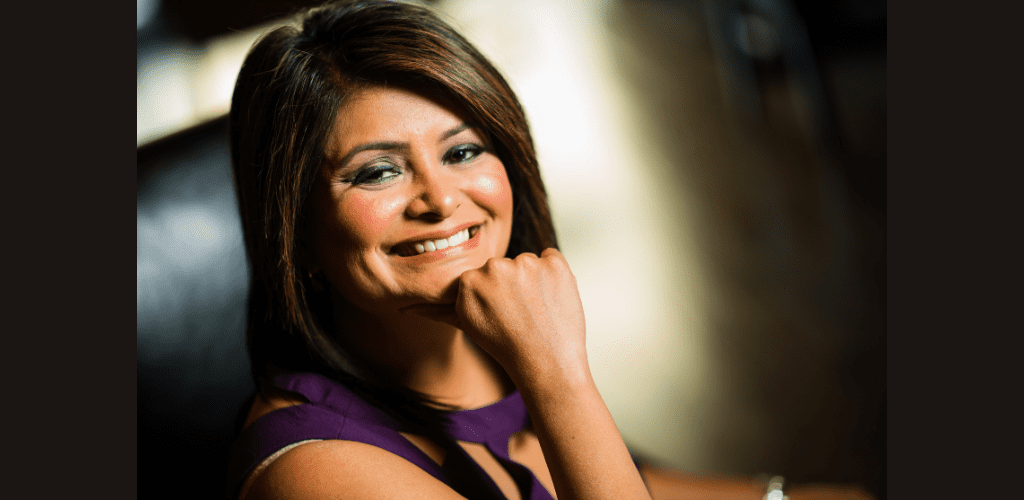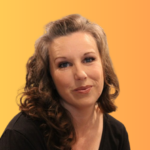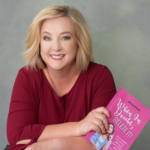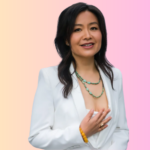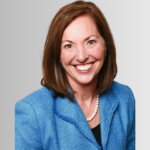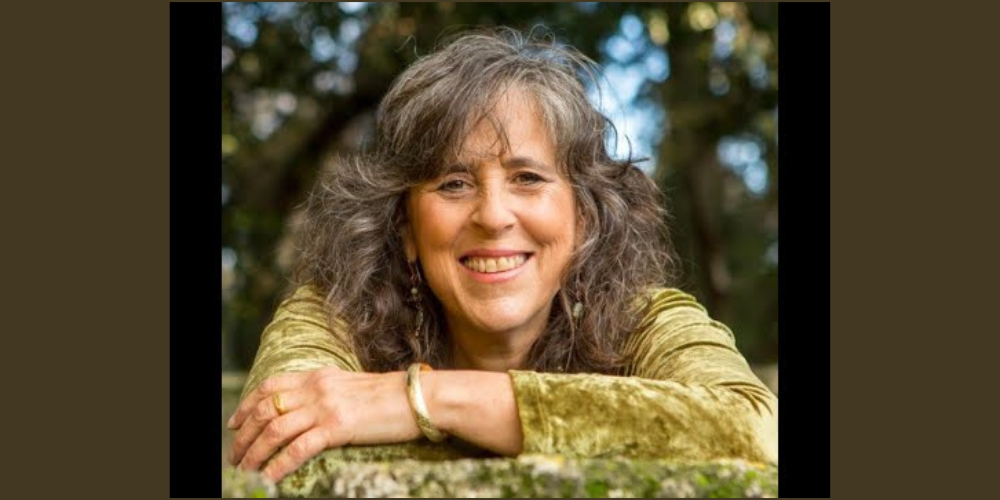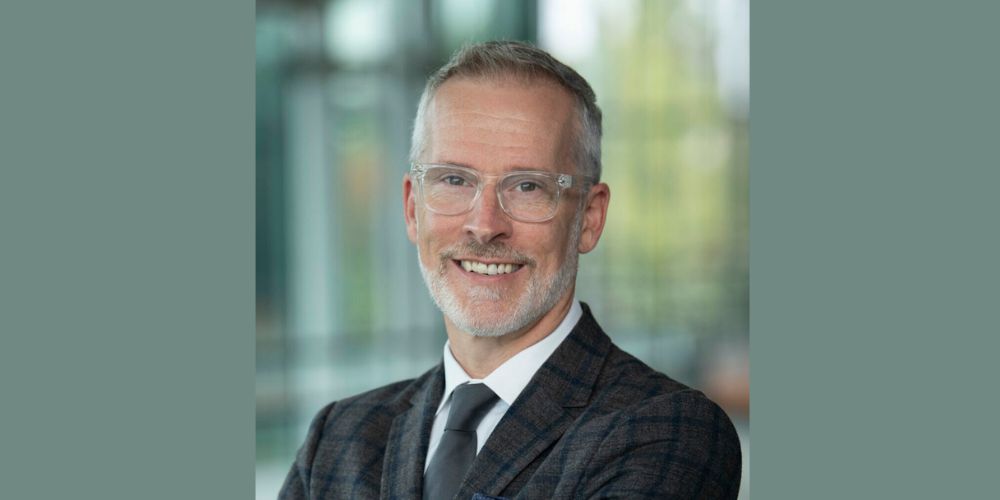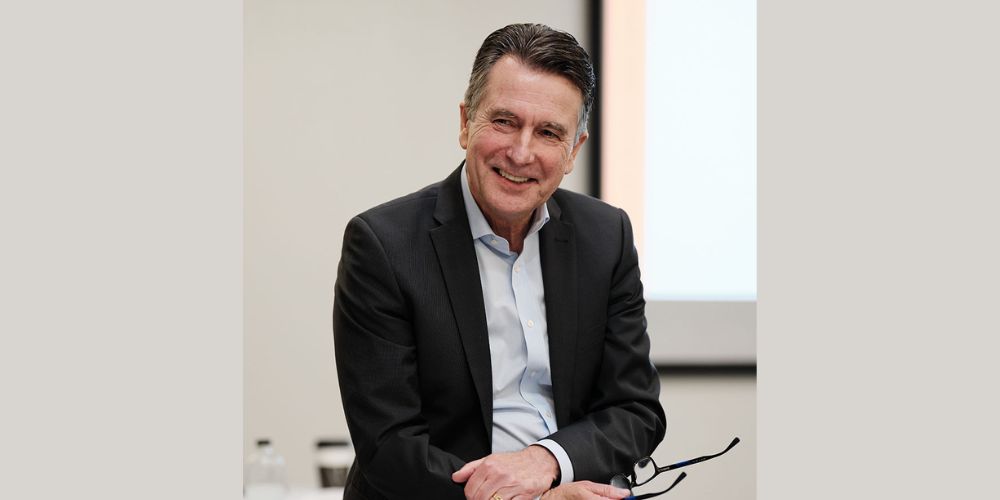Raj Girn: Hi, everyone, and welcome to ‘The Transform Your Confidence Show.’ Today is the last part of a four-part series called Leadership Communication is All in Your Mind. Along with my guests, all of whom have been founders and CEOs, we have shared insights on how leaders should incorporate effective communications to get optimal buy-in across corporate and entrepreneurial ecosystems. So far in the series, I have spoken to public relations expert Anita Chatterjee, beauty educator Tamanna Roashan, and hotelier Reetu Gupta.
This week, as we close out this series, I speak with media veteran Joya Dass, who brings her years of experience and expertise to the table. Joya began her career on the other side of broadcast journalism with a degree from Boston University. She then went on to work with a slew of mainstream media houses across America like CNBC, MSNBC, CBS, Bloomberg TV, CNN and ABC News.
Her interactions with women in the workforce, as well as her own challenges, led her to identify a gap in the marketplace, which encouraged her to take the helm of a professional women’s organization called LadyDrinks, which mandates the acquisition of knowledge, training and resources to women looking to empower themselves and move the dial on their professional careers. Here’s our deep dive into her perspective on leadership and effective communications as a woman of colour who conquered the mainstream media space, and is now paying it forward to all women with the mindset and tools to demand a seat at the table on their terms.
Here is our conversation:
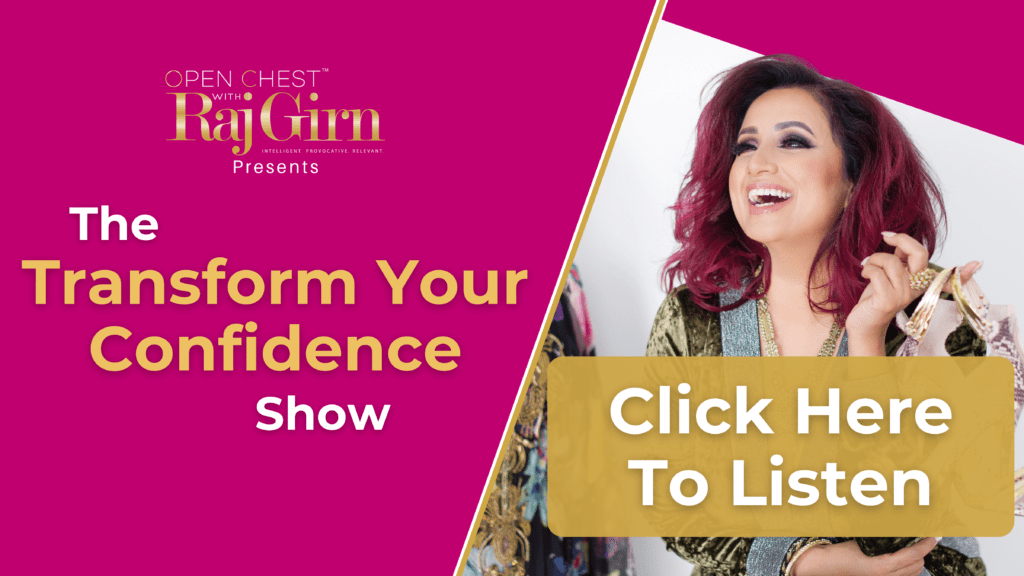
Raj Girn: Joya, what an absolute pleasure to have you on the show. For those people who don’t know what’s in my head right now, this is a real fan moment for me. I’ve been following you for as long as you have been on TV. I just finished telling everybody about how fabulous you are.
And I just want you to know how I feel about you. And thank you so much for kind of being one of the OGs to really put all women out there. And welcome to the show.
Joya Dass: Thank you, Raj. It’s great to see you. We’ve sort of had this mutual admiration from afar, and today we get to actually chat in person, which I love.
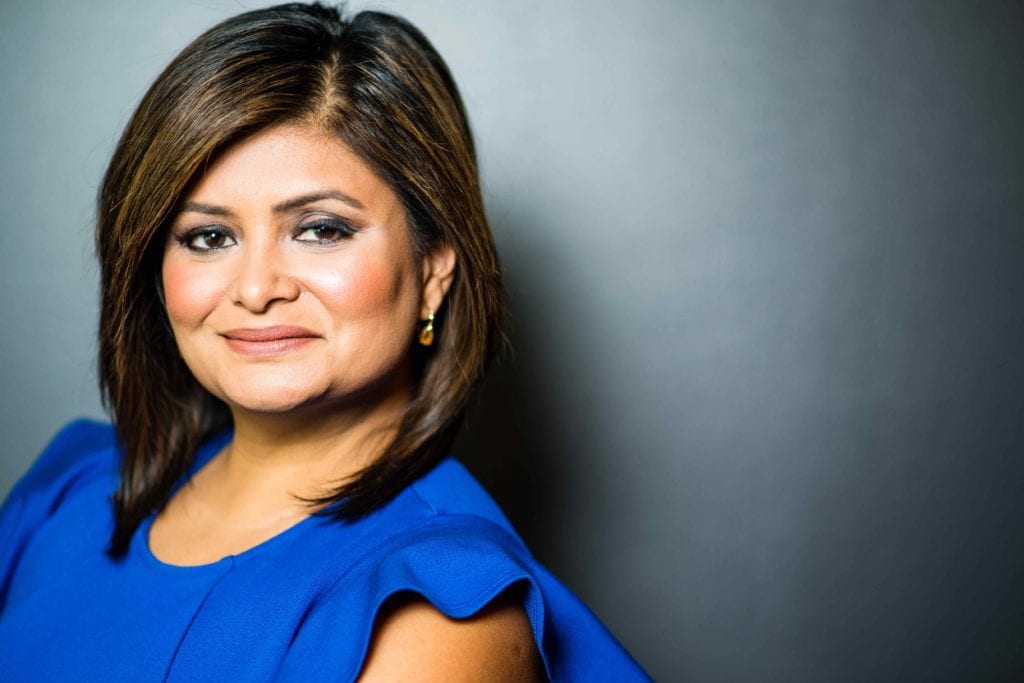
Absolutely. And I’m dying to get straight into it and pick your brain. But before I do, I have to share something with you. Your name, Joya Dass, sounds like it should be a fashion label or high end perfume. Have you ever thought of that?
I know. I’ve thought about putting it on bourbon, about being on scotch, but my head hasn’t gone into the area of fashion or beauty.
I think you need to do both because it’s just the name is beautiful. Joya Dass — I feel like it needs to be on something.
So it’s a very Bengali name. My parents are from Calcutta and Burma respectively. I`m 100 per cent born American. But yeah, it’s a nice short first name, last name, no middle name. I didn’t get one.
Oh my gosh. Well, it’s lovely. Anyway, let’s get into it. Joya, I have so many questions for you and I want to ask you a question that I’ve been asking all of my guests this month.
This is actually the fourth of a four-part series that I’ve been doing that I wanted to kind of kick off this particular podcast series with. And it’s quite simple for people like you and I, but not so simple for a lot of people that don’t really understand what it means to be a leader, which is a huge discussion. I’d like to begin by asking you what leadership actually means to you. Some sort of a definition that explains your specific belief system and the one that led you to decide that you wanted to launch LadyDrinks, this community that you have of incredible women that are doing some really wonderful things out there.
What led you to that, that you felt potentially may have been lacking in terms of leadership?
I think the number one thing that to me is leadership is showing initiative. Even before I started this, I would always figure out creative ways and out-of-the-box ways to get my friends together. And they would often say, “Joya, I don’t know about this whole television thing. You’ve clearly missed the mark because you were such a fantastic event planner.” And I mean, wine tasting, scotch tasting is on a boat. Polo matches. I’m always setting up things on a big scale on a big plane. So I think showing initiative is what to me, a big piece of what leadership means to me.
I also think leadership is listening. And I don’t mean just listening to respond. I mean listening to actually hear what the other person has said because I think so much is in the unsaid. So really being able to understand what the person is saying and what they’re not saying to me is a marker of not only leadership but high emotional intelligence.
“Leadership is a lot about being really organized. I sit down religiously on Sundays, I look at my week, I look at my goals. That time is sacred. I’m not out for boozy brunches because I’m really strategically thinking about the long-term and short-term goals and how I need to get there. How do I need to move the puzzle pieces around in my life to make sure self-care is happening? The business is happening. The relationship is happening. All of that needs time and strategic planning. And that’s something, to me, I think is a huge marker of being a leader.” ~Joya Dass
I think the final piece is vulnerability. I’ve always been very open and transparent about my own story. And LadyDrinks was truly born out of a pain point when I told my Indian immigrant parents that I wanted to be a television anchor, and I’ve known it since I was four years old. It wasn’t something they could get behind financially and it wasn’t something they could get behind emotionally. I was a girl, I wanted to live in New York City, I wanted to date who I wanted to date and I wanted to live life on my own terms. They weren’t on board with any of that.
So I left at 18, and I paid for college and I paid for grad school. And I paid for every move around the country by myself to come to New York and do what I’ve done for the last 20 years. But I wouldn’t have lived my life any other way. I also from a home of domestic violence, and that was something that was a huge driving force to get me out of my home. And so for me, I’m very open and talking about that because that’s what made Joya who she is today.
Right. Absolutely. And it’s such an incredible and powerful story for anyone out there that’s listening to Joya tell us a little bit about her story. It’s very difficult to have the courage to do a lot of things that we wish, like our spirit wants us to do when we’ve got all of this kind of veins that are holding us to the ground of culture and to expectation. And that’s a huge piece, especially as women of colour. We are very challenged as women in general, because even though we see in social media and we see all of the news talking about how women are really kind of emancipated, #MeToo movement and all of this, in the reality of day-to-day living, it’s still a massive gap in expectations and judgment associated with gender roles.
What are your thoughts on that, Joya? Do you agree that’s been your experience as well? It has been mine for sure.
I think that we are conditioned as women to succeed in the home and not to succeed outside the home. So for me, I’ve always been a precocious little kid. I’ve always had visions since I was a kid. You know, I’m talking about all these events that I would organize for my friends, but I always had a vision and I always had conviction about where I was going. And I don’t know that any of those other trappings were ever going to hold me back. I think that my parents gave up and stopped paying for college when I left, and I think they fully expected me to come back with my tail between my legs. But I wrote and wrote and wrote and wrote until I found somebody to give me a scholarship.
And then when that money wasn’t enough, I marched into the CFOs office and I said, we are going to sit here and we’re going to jerry-rig a solution. But I am not leaving. The only direction I’m going is forward and I’m not going backward. So I think having the vision and having conviction and learning how to cultivate that inner sort of strength is some of the biggest piece of work. But nobody ever tells us that.
“I think having the vision and having conviction and learning how to cultivate that inner sort of strength is some of the biggest piece of work. But nobody ever tells us that.” ~Joya Dass
Right.
I’m lucky that I had it as a gift, but nobody ever tells us that. I think the other piece that I will add to that conversation, and what has given rise to my women’s leadership movement today, is that you’ve got to build support systems. I became a master installing other strong men and other strong women as my support systems along the way. Otherwise, I was never going to be able to craft this high-profile career in New York City, of all places. So for me, my business today is geared towards elevating South Asian women.
But the way I’m doing that is that I’m building this fortress and building the support system around you. So if you want to be managing director, you want to be CEO, you want to be chief diversity officer, we’re having those conversations. But more importantly, we’re sharing the resources to help you get there, whatever success looks like. But it was truly just born out of my own pain point because I had to install other people to get me to where I needed to go.
That’s just incredible. And from that came about LadyDrinks. I’m curious on the name of the organization, and maybe if you could also share some of the pillars or anything that is a need to know for any women out there that are listening in or watching this, what do they need to know about LadyDrinks?
You know, I’m on a healing journey right now, and I’m a big believer that life happens for you, it’s not happening to you. In 2010, my contract came up for Channel 7, and at that point I had logged at least 10 years of getting up anywhere between 2:30 and 3:30 in the morning, getting into work, and being on the air by 5:00 am. And if anyone has ever done that schedule, it’s a grind. The other piece of it is that I was doing news. I was doing morning drive news. So I looked back on my career at the 10 year mark and realized I didn’t necessarily have a body of work that I could say I was proud of.
And so I started a production company on the side to do longer pieces in order to be able to take the time to revise them and make them beautiful. But because I was still on the air, my contract got picked up by another network. Immediately afterwards, I took on a business partner and my business partner Greta had started LadyDrinks in Toronto.
Yeah.
It started as a monthly meetup for women in film and TV to network and get jobs. She got married in New York, to a New Yorker, and moved here. And when we went to City Hall to register our little production company, she said, “Joya, could we start LadyDrinks in New York?” And I said, “Sure.” But low and behold, at that point, I’d also been on TV for a very, very long time. And a whole generation of Indian girls had grown up watching me at a time that no Indian women were on TV. So we started hosting these first events and 300 Indian women were showing up. And I was totally overwhelmed, and with that I realized in July of 2012, which is when we hosted our first event, that maybe I was actually in a place of responsibility, whether I liked it or not.
“I had access to leaders of business. What if I took that level of success and that dynamic, moved it out from behind the TV screen, moved it in front of a live audience, and created teaching moments, learning-based networking for this demographic of women that were showing up to my events anyway? So that’s how LadyDrinks got started.” ~Joya Dass
Gretta, by the way, was English. She didn’t know what the heck hit her. She was like, this is about you. And she left within a year. But she gave me a really big gift, which was the name, which is a little bit cheeky, but also this concept.
Absolutely, it kind of leads into my next question, actually, the entire set that you just mentioned, and that’s kind of the mind shift component, which is always the most fundamental piece before you can really understand the knowledge and to be able to action it. So I want to ask you, from your experience, and also in lieu of the fact that LadyDrinks is also predicated on this being a part of what needs to be in place in order for you to take the next step, what are the top three mindset shifts that women need to make in order to ensure that their qualifications and experience speak louder than their gender and ethnicity? I know that’s a big one.
I think it’s having agency and knowing that you have agency over the process. I think about a time that I was up for an anchor job, and I had all the leverage in the world without getting into the details of the situation. And when the person slid the salary and the contract across the table and I looked at that number, I was just so bloody happy to be at the table and be invited to be on the number one station in New York City, the number one station in the country. I just signed on the dotted line. I didn’t even negotiate. I think it’s important to understand that I needed to know what that seat commanded in the marketplace. What was the salary that that seat commanded?
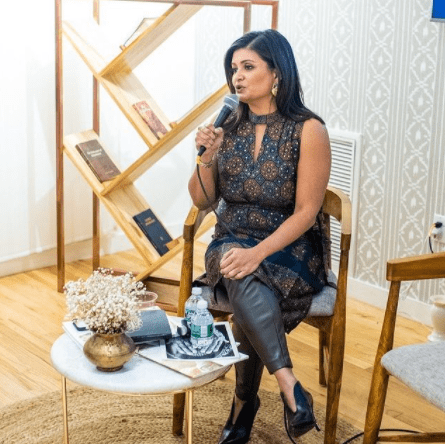
I later learned that I was making a third of my predecessor. I think it’s important to understand that the piece of paper when I sit across the table is just the starting point. That is not the finishing point. So I think the big mindset shift is that I have value. I deserve to be here. I have earned this. But now let’s talk, let me have some agency over this process. I think the second piece is communication skills. One of my favorite mentors, Les Brown, says that when you open your mouth, you start to tell the world who you really are. And I’m gifted and I’m lucky that that was something my mother really invested in since I was a kid. But your mindset really has to be around that.
I have something important to say, whether it’s from your angle of expertise or maybe it’s from the angle at which you sit — maybe you are a dermatologist, maybe you are a psychiatrist, maybe you’re a botanist where you sit — you have an angle on any topic in the world and understand that you have value to bring to the table from that angle is what you need to know. There are no new stories. There are just new ways for you to be able to tell it. You are the most unique thing you bring to the table. So bringing those personal stories to the table are the most important thing that you can do.
“There are no new stories. There are just new ways for you to be able to tell it. You are the most unique thing you bring to the table. So bringing those personal stories to the table are the most important thing that you can do.” ~Joya Dass
I think the third mindset shift that’s really, really important is to understand that everybody is just consumed with their own thoughts. Dr. Daniel Amen chairs the 16, 40, 60 rule, which is at 16 years old, you think everybody’s looking at you. At 40 years old, you realize you don’t give a damn who is looking at you. And at 60 years old, you realize that nobody was looking at you because they’re all consumed with their own thoughts. So how can you leave the room better than how anybody was when they first walked in. How can you educate them? How can you share with them? How can you just make them better long after they’ve left the room, and they’ve left your company.
You’re asking about the pillars of LadyDrinks. Ironically, sometimes you don’t see the waters in which you swim, but people kept asking me to teach them public speaking. So I formulated this master class and the framework that I teach is I need you to take a personal story. I need you to promise me something, the beginning, the story in the middle, and then the takeaway, the gift that you’re going to leave the audience that they get to marinate on long after they’ve left you. But again, how the mindset shift is, how do you leave people better than they were when they first walked in the room?
Guys, if you are just joining us, I’m in conversation with the fabulous Joya Dass. She is giving us some really experience-centric words of wisdom about some of the things that we don’t generally tend to look at as women, as communicators, and also the opinions that we have about ourselves.
Are they really marrying in with what people are actually thinking of us and should we really care? I mean, a lot of a deep discussion can be had on that. But because I have so little time with Joya, I want to make sure that we’re able to move on. Before we do Joya, I just want to give anyone out there, any woman out there that is listening and is watching this, how can they get a hold of you perhaps for this course that you are doing and perhaps even for anything else you do? I know that you also offer one-on-one coaching. Can you share a little bit about that?
Sure. The same framework applies, but the one-on-one coaching means that the entire six weeks are designed bespoke to whatever your goal is. I worked with a sports medicine physician who wanted to create videos for her Instagram, but they needed to be evergreen videos, really explaining her philosophy and dispelling any myths about who visits a sports medicine physician. So those one-on-one coaching sessions are really, truly designed to bespoke to her and her goals. It’s also tailored to that person’s schedule.
Now, the masterclass, however, happens at a set time. It’s every Wednesday, 5:30 to 7:00, for six weeks. I have speakers that come in at the top of that. But some people like the dynamic of being able to practice in front of a group, get feedback from the group, get feedback from me, because they don’t necessarily want it to just be one-on-one. They want to be able to practice. And I think that’s the big differentiating factor between the masterclass that I offer and the one-on-one coaching to get in touch with me. It’s [email protected]. I‘m also on social media, so it’s easy to find me. It’s @joyadass on Instagram, on Twitter, and on Facebook.
To get in touch with Joya Dass: [email protected].
Social Media: @joyadass on Instagram, on Twitter, and on Facebook.
Isn’t that wonderful? What I want to do now is I want to kind of deep dive a little bit further regarding your experience of having worked in a very male-dominated environment.
So let’s go then. Next, as a trained and experienced media personality who has anchored for multiple big-box media on the floor of the New York Stock Exchange and so much more, which is a very male-dominated environment, we know this very intimidating, you would assume for women, especially the way that we are cultivated in the home environment as we kind of grow upright. The conditioning we get versus then being in an environment like this, which is kind of x 10 testosterone.
What have you learned to be the best way to command and stay in control of a conversation as a woman in this kind of arena or any other industry that is male-dominated without coming across aggressive? Because that’s kind of the first thing that people will say, especially men that, well, she’s a bit aggressive. So I guess my question here is what is that fine line between differentiating when you are being aggressive in your communications versus being assertive?
Again, I know this is relative, right? This is relative to whether you are the aggressor or the one that is being aggressed upon. And what are your thoughts like? How do we make sense of this as a woman that is maybe now entering the workforce? She’s finished school and she knows that she’s going to be going for a very male-dominated arena, like how do we set her up for this?

So I think it’s important to define what is aggressive and what’s assertive, and what does that communication look like?
“Aggressive is what’s in it for me. It’s very much ‘me’ focused. Assertive is what’s in it for ‘us.’ And I think the big differentiating factor between aggressive and assertive is that you need to make sure that the other party always leaves with their dignity intact, that you’re always respectful, and even if it’s time to walk away because you haven’t reached an agreement, being able to say that and still be able to maintain the relationship.“ ~Joya Dass
So I think defining that first is the main thing for me. I was stationed on the stock exchange floor, although the networks have changed over the years. Bloomberg, CNN, ABC, CBS, every four years somebody else will pick up my contract. But where I fundamentally report to work was the stock exchange floor. We all know, if you’ve ever seen pictures, the entire floor is pretty much all male. And I also was interviewing CEOs that were ringing the opening and closing bell nine times out of ten. Those were also male. So I really did two things.
One is that in the commercial break, whether the CEO was brought up to me and I was waiting to interview them, I would try to establish some common ground. I realize that I couldn’t just talk about work. I’d just be a one-note wonder. And so I actually took myself to a Glenlivet tasting and taught myself everything about scotch, and I taught myself everything about cigars. And so if I could, even in those three minutes while we were in a commercial break, I would establish a common ground about scotch or travel or something just to put the person at ease before the camera turned on. And we actually got into our interview that did me a world of favour, regardless of who the CEO was, if I could establish that rapport and also understand, is this person going to give me one-word answers or is it going to be hard to shut them up? Am I going to have to rein them in? Really reading the room and understanding who my audience was a really, really important piece of helping me to assert myself in that situation.
I think the final thing is not being afraid to cut people off. I’m functioning with very tight bumper guards around me. There’s a commercial break and there’s somebody counting me down in my ear saying I need to wrap, so I have to be able to break in. Thank you so much. I’m going to leave it there today. But having some of that language that kind of reigns people in, tucked away in my back pocket and ready to deploy in real-time has been a real piece of empowerment for me. Sometimes when my back’s up against the wall and I’m in a tough situation, just having that language and having those scripts in my head has really done me a huge favour. So establishing common ground and having scripts that allow you to be able to establish boundaries essentially has been really important.
And these are the kinds of things folks that Joya is an expert in and she teaches to her one-on-one clients, and also through her group program. If this is remotely familiar to you in terms of being a pain point, being a problem that you haven’t been able to solve for whatever reason that may be, I would really recommend that you hit Joya up. Again, ways to contact you for anyone that joined us after the last time we talked about that.
Thank you. It’s [email protected], or you can always hit me up on social media. It’s @joyadass and that’s pretty standard across Twitter, Facebook, Instagram. You can always find me under that moniker.
Brilliant. The takeaway I got from that, I mean there are many, many takeaways. But the big one that really speaks to me, Joya, is the fact that communications is not just a diary moment. Speaking words doesn’t make it communications. The scripting, the understanding of what it is is the intention with the words that you’re using, your tone of voice, cadence. These are all things that I know are incredibly impactful in whether you are or are not being successful and effective in your communications.
“Communications are not just a diary. A moment like speaking words doesn’t make its communications, scripting the understanding of what it is. That is the intention with the words that you’re using, your tone of voice, cadence.” ~Raj Girn
And these are the kinds of things, guys, that Joya is really, really one of the best in the biz at. So I know I’ve said it again and I’m saying it again, If I was to ever want to learn this, it would be from Joya. She knows what she’s talking about and she’s been in some of the most difficult situations to be able to get the magic, like the magic communication piece from the person in a very small amount of time, in a very stressful situation. So when you add those layers into normal, effective communications, you know that the person is going to figure out a thing or two.
So with that said, Joya, I do want to kind of move on to my next question. And basically, this is one that I think is really important. It’s one that is such a cliche question, but I feel that every single time I ask a question like this, I get another nugget of wisdom. So I’m going to ask you. What advice would you give to women foraying into male-dominated industries of all kinds so that they are better positioning themselves to be taken seriously as an equal? And I know we’re still having this discussion, but unfortunately, this is still a thing in today’s day and age. We can’t quite get our heads around how to accomplish that.
I mean, my perspective is, is that equality is a mind thing. You walk in with that piece. But the mind thing, when you’ve come from certain cultures or certain upbringings or been exposed to certain environments, it is a very difficult thing to accomplish. But I know that you’re going to add a lot more wise wisdom and thoughts of people that take the action. Like, what are your thoughts around that?
I know I’ve taught so many women now and I’m in front of my membership every day because I hosted calls with them. I think the number one place where women do themselves a disservice is they don’t answer the question that was asked of them. They go off on Bible stories and they’re getting into the story of their lives or are telling you what happened when they went to the grocery store, but they’re not answering the question that was actually asked of you. So if you can stay on point and stay on message, I think that’s one of the biggest ways that you can be taken seriously. If you’re giving a talk and you’ve promised X, deliver X, because guess what? That exercise of following up and delivering X builds trust and brings credibility. So if you are promising the X, but you suddenly deliver Y, all of a sudden you have eroded that trust and that credibility.
So really, again, this is something I teach again and again in my class. Anybody can be a compelling speaker, but you’ve got to be able to tell a personal story that illustrates why you navigated that client matter in the best way possible. And what did that client matter in the way you navigated it, say, about your leadership, how can you package up your wins of whatever job you’re in, how can you tell me a story about a time that you won or you did something that was really tough and you came out on the other end and you learned this? I think that that is probably the one nugget that I can leave with you is that women need to be able to figure out just how to be able to sell themselves, brand themselves, and be able to have more influence in the room.
Women need to be able to figure out just how to be able to sell themselves, brand themselves, and be able to have more influence in the room. ~Joya Dass
Our brains were trained. Our ancestors sat around the campfire, and how did we exchange information? We told stories. And so today, even today, when you are sharing something and you’re just throwing data, you’re really only engaging two brains. But when you tell a story, you’re engaging all three brains and that’s what makes you impactful. And I think that somewhere along the way, we lost that art of storytelling. And I want to really be able to usher that era back because that’s how you impact people.
Absolutely. Here, here. You know, that actually brings me to another thought that I was having Joya, communications is clearly, as we’ve established, how important it is both on the positive and negative side. What I wanted to ask you is we are sitting in the middle of a pandemic. We are in lockdown. We are working. We are relaxing. We are doing “me” time — everything in closed environments for long periods of time with a lot of people who are either in our family, different generations, a lot of different dynamics.
And the single biggest issue is — what is the mental health associated with that? I mean, the numbers we have all seen in the media, we can see it everywhere have skyrocketed because it’s not human nature for people to be in closed environments for a long period of time with the same people doing multiple different things. What are your thoughts? Are there any tips that you can give to people who are dealing with that right now?
I think that this takes us back to what I was talking about earlier, which is having boundaries. It’s so important to be able to say in real time, “I can’t do that right now, or I know that I did that last year, but I’m afraid I’m not going to be able to do it this year. Thank you for understanding.” And we all, of course, have incorrigible parents that never want to hear the word “no.” But being able to say no, and no is a complete sentence, and being able to say no and then sit in the uncomfortable silence. And by the way, this takes a lot of practice, but being able to say no and just let it at that is probably one of the biggest things that I have learned by observing my mentors and other people around me, and also just saying I need to take a break, I need to take a break, and I need somebody else to help me. Somebody else needs to pitch in and take over right now because I can’t physically do this or I mentally can’t do this.
I’m coming off of COVID myself. I’ve just had it for the last three weeks and I think I was most mentally challenged because I’m used to going one hundred miles an hour, and I couldn’t because my energy was just zapped and I had to learn some grace and I had to learn some forgiveness for myself. But it did not sit well with me mentally. And so for me, I reached out to a healer and I did four sessions with her. I reached out to a therapist. I did a session with her. I am not beyond reaching out for help and saying I’m drowning here and I need some support.
You know, it’s so interesting that you’re saying this, Joya. I mean, like every episode I’ve done so far of ‘The Transform Your Confidence Show,’ the underlying theme that I’ve been really putting out there for people, a part of the journey that I’ve been sharing about my life has been that the bravest thing that I’ve ever done for myself and the greatest thing I’ve ever done for myself is to ask for help, mentors, coaches, consultants, the layers of trauma, that we go through, that I’ve gone through, you’ve gone through . . . We go through as women, as women of colour, as women who are living in two different identities and cultures like how do we make sense of all of that when oftentimes they’re not congruent with who we are. They don’t fit into each other’s worlds nicely.
There’s just so much disparity that’s involved in what that’s all about. And I say this over and over again, and I’m so happy to hear you saying this. You know, a woman like you, a woman like me, people look at us and they think to themselves, I mean, they can’t possibly have ever had any problems. They don’t really have any problems. They just seem like forces to be reckoned with.
We all that’s because of everything that we’ve gone through and having the courage and the braveness to say that I’m vulnerable, I cannot deal with this, and I need to bring someone in to get me out of this hole that I don’t know how to navigate myself out of. Thank you so much for sharing. That, I think, is very powerful for people to know, especially women and for men to know.
“What makes for a strong character has to do with all the pain points that we’ve had to deal with and we’ve had to overcome, and that we also recognize some of which we are still trying to navigate through.” ~Raj Girn
You know, I had hired a yoga teacher when we rented a home upstate for New Year’s. And what was interesting is that she said that the lion’s share of her clientele right now isn’t women, it’s teenage boys. This whole feminist movement just comes up and now all of a sudden, men also need support. And she’s saying these kids are just like, “Oh, okay, I see that my sister, my mother, my friend is getting all the support. But what about me? What’s appropriate for me to say and what does empowerment mean for me?” The pendulum has almost swung in the opposite direction. And she is a yoga teacher, and is finding that she’s having to really tap in and teach a lot to these teenage boys. So I think you bring up a really interesting point. I know you have a young son yourself. I think men have to be just as much part of the conversation right now as women do.
Absolutely. My gosh, I think I need to bring you on just to have that discussion for another show. Definitely. I want to ask you this question that I feel is really important. I mean, we’ve talked a lot about the knowledge piece and some of the actionable pieces.
I want to hone that back in and bring it to the workforce. So I’m a firm believer in holistic leadership where my definition of that is that everyone gets the opportunity to hear and be heard from all relevant perspectives when a decision involves them in some capacity. I believe that effective communication is key to achieving this. And when a person is in a leadership position, whether it’s C-suite or whether it’s supervisory level or anything in between, that I feel that these two things that I want to kind of go on to your experience from and your expertise from. One is what are the things that need to be in place between each top-down tier of infrastructure to ensure that things don’t get lost in translation and so the leader is a holistic leader? They have a message and by the time it gets down the food chain, how do we ensure that we don’t lose what that message is or it doesn’t get changed somehow? What are your thoughts on that?
Well, I can speak from personal experience. I’m a big fan of not only documenting and branding myself but documenting my processes. So as I continue to build my team — in the last year, I’ve hired a little team for the first time. It’s important to have those processes documented. How I do things is part of that knowledge share in order for the next person to be able to do it Well, nobody acts out of malintent, they just act out of bad direction. I’m a big believer in that. So if something doesn’t go the way I wanted it to, where did I fail in being able to thoroughly document and road test the instructions that I gave you?
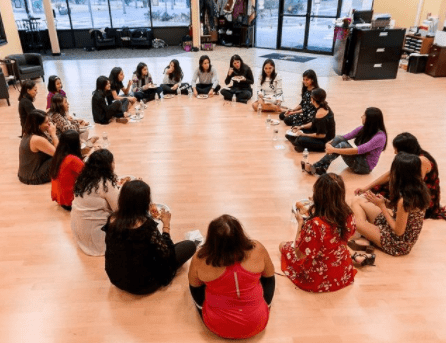
I think the other piece is — and this happened when the Black Lives Matter riots were happening here in New York City. I do these calls throughout the week with my membership where I ask about a challenge and I ask who they want to be connected to. And I became very quickly aware that all of the riots and the things that were happening with Black Lives Matter, were weighing very heavily on my membership and having conversations about work just wasn’t appropriate. So I pivoted very quickly. I brought in one of my members who’s a licensed therapist, and we created a space where people could have a guided conversation about what they were feeling about what was happening. So I think it’s important to create that psychological safety that I can talk about what’s top of mind.
And it came up again two weeks ago when things went down on Capitol Hill that was very much top of mind with my women, that they were very upset and disheartened by what was happening in Washington. And I needed to create space for that dialog to happen and coexist with the dialog about business. So I think that it’s documenting your processes to make sure things are being filtered down in the right way, road testing those processes, making sure a third party is checked in and see where there are redundancies, see where there are gaps, and then it’s just creating psychological safety where people feel like they can share what’s on their mind without feeling like there are repercussions or getting our punishments or there’s no space for this to be able to be had.
Absolutely, and, this brings me to an article I read in Forbes recently where they were talking about research that was done on the best leaders during COVID times. And the number one on that list, I don’t know if you read that, but the number one on that list was a CEO who gave a free membership to a specific app for mindfulness meditation, et cetera, et cetera, to all of his employees down the food chain. So this is the kind of thing that for me defines what being a holistic leader is. And the effective communication piece that you’ve been talking about throughout this is something that is very, very deep and layered. And you have to learn how to do it right. And you’ve got to go to the right people that can teach you how to do that, irrespective of where you’re at. A lot of us think that we’re great communicators because we use a lot of words, right? I mean, I know that you know what I’m talking about here.
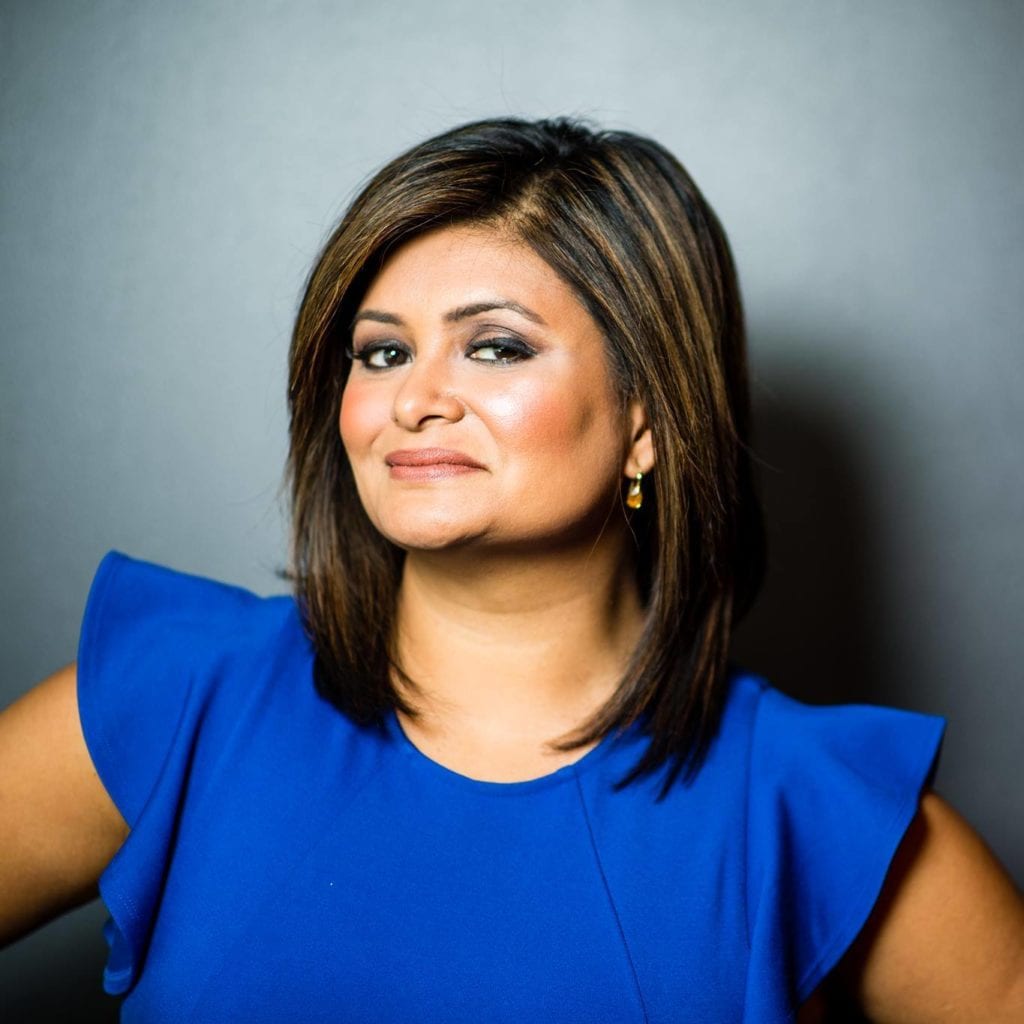
Part of the communication is listening. So much effective and impactful communication is in listening. And I said at any point in your first question, what’s in the said and what’s in the unsaid? And can you parse out the difference between the two? Because sometimes people are conveying so much more with their body language than they ever are with their diction. And that day when everybody was really weighed down by Black Lives Matter and the riots that were happening right outside of their windows, I just knew that I had to toggle quickly. Talking about business had to be on pause for the next two weeks.
Absolutely. The whole conversation here has been about communications, understanding what it is, what it is not, having some tactical understanding of some of the things that you can implement into your own personal life and your professional life. Joya, for anyone out there who still doesn’t buy into how important it is to be able to effectively communicate, especially as a leader, especially as someone that’s even a parent in their household, that’s also a form of a leader too. What would you say to those people so that they can quickly understand how important it is to have an effective strategy to dial into that ecosystem, whether it is in a huge organization, a small organization, or even at home?
I had a general manager at my very first television station say this to me. He was like, “Joya, stop trying to be the TV anchor you think you’re supposed to be and just be yourself.” So I think point number one is to just be yourself. I think that we wear a lot of different veneers, but again, as part of my healing journey, like who is Joya when you peel away what I do for a living and really leading with that level of authenticity.
I think the second piece is to communicate and communicate often. I find that people have to hear things sometimes seven times before they really hear me. But just because you had to say something seven times doesn’t mean it has to be seven different ways. It can be the same message. It’s just that they didn’t hear you until the sixth or seventh time. So I think saying things and saying things often until you actually feel heard is important. And to pony up on that, I think also I will if I’m listening to somebody, I will say to recap or here’s my understanding of what you said because that affords the other party to course correct you in real-time. If I didn’t hear you, I didn’t understand you, then I at least am saying, well, this is what I heard and you can tell me if I’m wrong. And I think that’s a huge piece. And I do that constantly with people because I’m like I just want to make sure I understood what you just said to me.
I’m a certified coach. And one of the things that they teach you at the ICF is exactly what you just said there — don’t assume that you understand what they’re saying because that what’s in their head and the words that are coming out may not match. So to just intermittently keep checking in and asking them that question is incredibly important to ensure that the line of communication from the both of you is always moving forward. So that was very powerful Joya that you brought that to the table. This actually brings me to my final question.
“Don’t assume that you understand what they’re saying because what’s in their head and what words are coming out may not match. So to just intermittently keep checking in and asking them that question is incredibly important to ensure that the line of communication from the both of you is always moving forward.” ~Raj Girn
I feel that we have just kind of started the discussions of this. So much more to talk about. I really want to have you come back on. I want to be able to tackle a little bit more from your wheelhouse of expertise and just really give people some caveats to be able to action in their own lives. Again, guys, I want to remind you that this is what Joya does as well, from a professional standpoint. She can help you one-on-one. She can help you through her group program. For those people who are just joining us at the end of the show, rewind this. You’re going to hear it from the beginning. Joya again one more time: how can people get a hold of you?
[email protected] or you can always reach out to me and DM me on social media, as Joya Dass. And that is the case on Facebook. It’s the case on Instagram and it’s the case on Twitter, depending on what your method of reaching out is.
Absolutely. And just to end things off, Joya, I want to ask you, is there anything that you want to leave everyone with? Any thought that you feel that you’d like to just kind of end the conversation with?
I think that I’ve said this before and I’m going to say it again — being yourself takes courage. I know this is an Indian thing, always worrying about what other people think has never been my compass. I know what I think and I’m going to act based on what’s here and what’s here. And so for me, that has always been my North Star. But I understand that it takes a little bit of cultivation and it takes a little bit of courage and it takes a bit of flexing that muscle. But if you can flex that muscle every day just a little bit by doing something that’s outside of your comfort zone, you start to understand what you’re like. You start to understand why you don’t like it and what you’re capable of. So my 20s and 30s were all about that. I’m 48 as of last year and I think that I’m most self-actualized than I have ever been at the age of 48. But it’s because I really spent a lot of time pushing, pushing hard against those walls that were kind of lined up for me and see what was on the other side.
Absolutely. Thank you so much, Joya. What an absolute pleasure. I myself am going to rewind this back and listen to this conversation a few dozen times. I know that I will, because it is kind of like when you see a really good movie and every time you watch it, there’s something you realize you missed. That’s this conversation that we just finish having with the fabulous Joya Dass. Thank you so much, sweetheart. I cannot wait to see what people say about this conversation and also the opportunity for us to finally physically meet each other after all the years that we have known each other. Thank you for coming to the show.
Thank you for having me.
Absolutely. Thank you Joya.
Thank you so much for staying until the end. I really hope you enjoyed the show. Before you leave I would love for your support by subscribing to my show and letting everyone, you know, know about it and have them come take a listen. I would sincerely appreciate you joining me at LinkedIn, Facebook, Instagram and YouTube search Raj Girn and The Open Chest® Confidence Academy. Until next week. I hope you continue to cultivate your own ecosystem so that everyone in and around it is empowered by your mission to elevate them all. See you next week.
To Contact Joya Dass:
Email: [email protected]
Social Media: Facebook, Instagram, Twitter.



